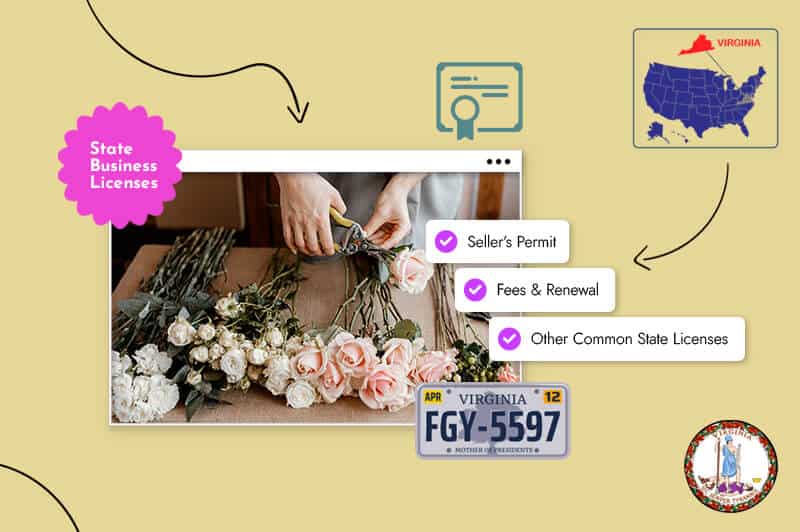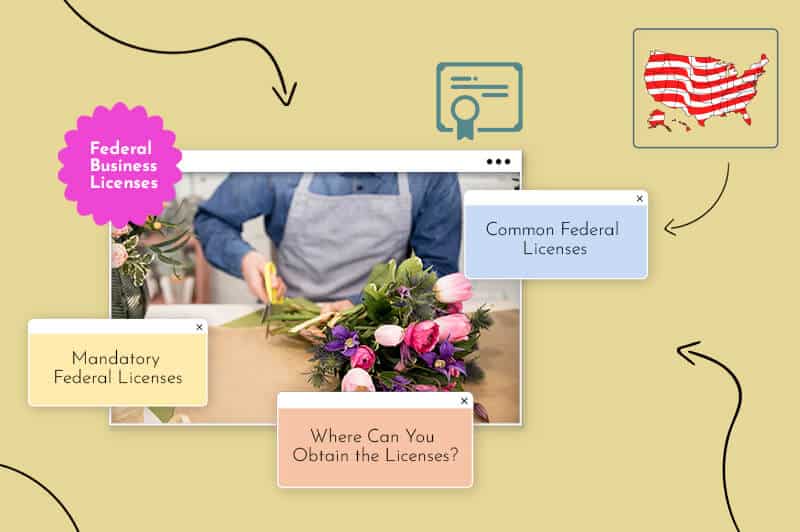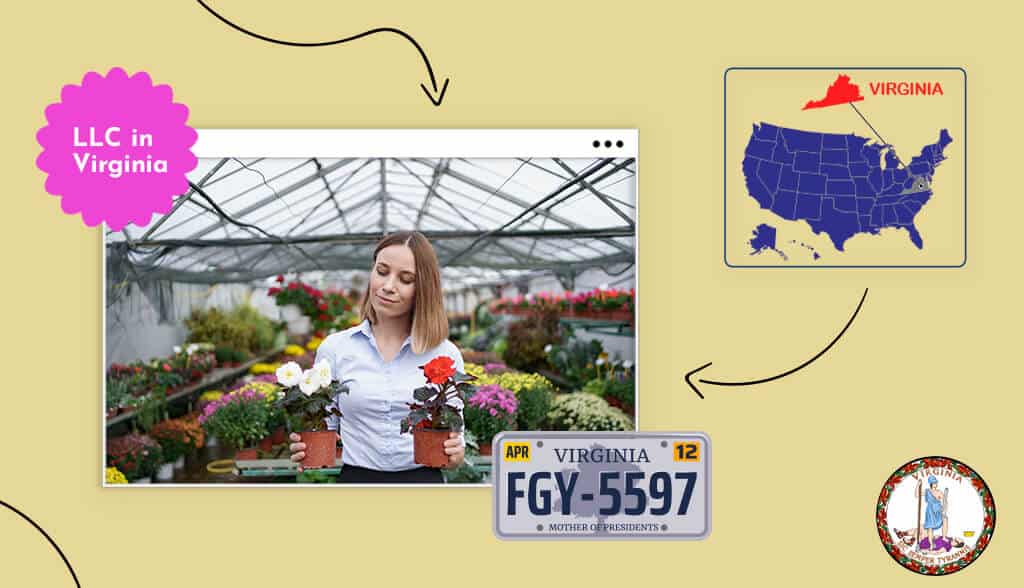Once you decide on starting a business in Virginia, you might need to get licenses or permits for some business activities. The Virginia State Corporation Commission (SCC) handles the registration of new limited liability companies (LLCs), corporations, and other business entities, but it does not issue business licenses. You will need to apply for licenses or permits with other state agencies, local governments, or the federal government. The following is an overview of the types of business licenses you might need and how you can get them.
What are business licenses and permits?
Business licenses or permits typically come from federal, state, or local government agencies. They allow your business to operate or engage in specified activities within the agency’s jurisdiction, such as a city, county, or the entire state.
If your business has operations in more than one city or county, you might need to obtain licenses or permits from each jurisdiction. The Virginia Business OneStop website has more information on the licenses or permits your business might need.
Business licenses
Registering your business with the SCC allows it to operate in Virginia. Some local governments may require you to obtain a license to do business within their jurisdiction. Cities like Fairfax, Richmond, and Virginia Beach require business licenses, as does Arlington County. You can check with your local city or county government to learn about specific license requirements.
You might also need a license for some types of businesses. The state licenses a wide range of professions and occupations. Businesses that engage in these fields may need one or more licenses.
Permits
While a Virginia business license allows your business to operate within a city or county, a permit authorizes it to engage in specific activities. You will usually need to apply for and receive a permit before you may begin an activity. Examples of business permits include:
- State or local taxes
- Zoning and land use
- Health and public safety
- Building construction or renovation
- Building occupancy
- Alarm
- Signage
How to register for licenses/permits
You will need to register with the government agency that issues a particular permit. Many agencies allow you to apply online, but you should check with each one to make sure. The Business OneStop website can provide more information.
What happens if I fail to obtain a license?
Operating a business without a mandatory license or permit could subject the business to serious fines and other penalties. In some cases, it could constitute a misdemeanor criminal offense resulting in fines or even jail time.
Local business licenses

Local governments tend to have the widest authority over business activities within their jurisdictions. While state or federal law might set some general guidelines, local officials deal with the details.
Check with local clerks
Your local city or county clerk’s office is your best resource for finding out what local licenses or permits you will need. If the clerk’s office is not responsible for issuing a particular license or permit, they can direct you to the agency that is.
Check with your county
Some areas of Virginia could have overlapping local authorities. While many cities operate independently of any county government, others share jurisdiction with the counties in which they are located. Your business might need licenses or permits from both the city and county governments.
Common city and county permits
Your business might need some or all of the following permits, depending on your business activities:
Zoning or land use permits
Cities and counties may use zoning laws to restrict the types of businesses that can operate in different areas. Offices, retail shops, and other businesses may receive permits to operate in areas zoned for commercial use. Certain other businesses would need permits for industrial-zoned areas. Businesses may not be able to operate at all in areas zoned as residential. Even home-based businesses in some jurisdictions might need to comply with local zoning laws.
Building permits
Local governments maintain building codes that set standards for all kinds of structures, including both residential and commercial buildings. These codes can cover building structures, infrastructures like plumbing and electrical, and issues like fire safety. Your business may need permits showing that your business premises comply with all local building codes.
Health permits
Any business that handles food must obtain a permit from local health officials. This kind of permit typically includes regular inspections to ensure the business follows local regulations regarding food handling and hygiene.
State business licenses

At the state level, business licenses allow businesses to operate within the state. Virginia does not require a general statewide business license, but certain types of business activities may require a license or other form of registration with a state agency.
Seller’s permit
A seller’s permit allows a business to sell products or services to consumers. Virginia refers to this as a “sales tax certificate,” but the name seller’s permit will also work.
This permit requires a business to collect sales tax from customers for the sale of taxable goods or services. The sales tax rate in most of Virginia is 5.3%. Some local governments may impose an additional sales tax, which might require a permit for each of those jurisdictions.
How to obtain a seller’s permit
You may obtain a Virginia sales tax certificate through the Virginia Tax website. The state prefers that businesses handle all matters related to sales tax online.
Fees and renewal
Virginia does not charge a fee for a sales tax certificate. You do not have to renew a sales tax certificate, but you do have to file returns.
Other common state licenses
Virginia requires individuals engaged in certain professions or trades to obtain licenses from the Department of Professional and Occupational Regulation (DPOR). Businesses may need to register or obtain a license to operate in these fields as well. Occupations requiring a license from the DPOR include:
- Architects
- Barbers
- Contractors
- Electricians
- Interior designers
- Land surveyors
- Plumbers
- Tattooists
If your business handles or serves alcoholic beverages, it will need a license from the Virginia Alcoholic Beverage Control Authority (ABC). Different licenses apply to different types of businesses. Alcohol manufacturers and wholesalers, for example, need an industry license. Businesses that sell alcoholic beverages directly to the public need a retail license.
Businesses must register with certain state agencies in various situations, although they do not need to obtain a license or permit from them. For example, businesses with employees must register with the Virginia Employment Commission, which collects unemployment tax.
Federal business licenses

Most Virginia small businesses can operate without any licenses or permits from the federal government. However, if they operate in industries that are subject to federal regulation, they might need to apply with one or more federal agencies.
Are there mandatory federal licenses?
A federal license or permit might be required if your business engages in activities that fall within a federal agency’s jurisdiction. You may obtain more information from the agency that regulates your business activity. Some federal agencies allow online filing.
Common federal business licenses
The Small Business Administration (SBA) provides a list of federally-regulated industries and the agencies that oversee them, including:
- Aviation, which is under the jurisdiction of the Federal Aviation Administration
- Firearms, which is regulated by the Bureau of Alcohol, Tobacco, Firearms, and Explosives
- Radio or television broadcasting, which is under the Federal Communications Commission’s jurisdiction
- Wildlife-related activities, which may fall under the U.S. Fish and Wildlife Service’s purview
What do I need to file for a license?
Different licenses and agencies require different information, but information that you will probably need for many or most applications will include:
- Name of the business, along with any fictitious business name (DBA)
- The business’s employer identification number (EIN) or your Social Security number
- The ID number assigned by the Virginia SSC
- The business’s physical address, mailing address, and phone number
- The type of business entity (LLC, corporation, etc.)
- Names and addresses of the business owners
- A description of the business’s activities, occupation, or industry
- The number of employees, if any
- The business’s current or anticipated annual sales
Filing fees can vary greatly. A license or permit application could be free of charge, or it could cost hundreds of dollars.
Conclusion
Registering your new business with the SCC is only the first step. If you’re just beginning, it helps to understand how to form an LLC in Virginia, since registering is only part of the process. To ensure that you can legally conduct business where you want in Virginia, you need to find out which licenses and permits you need. Your city or county clerk can help you, along with the SBA and other government agencies. Once you have all the required licenses and permits, it will be time to get to work!
